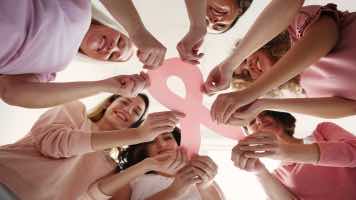
Watch this Article in Video Format
“If you want to live, you will live” Stories
women who survived breast cancer.
What to do if a serious illness is diagnosed already in the third stage.
I got an exam, and it was October, Breast Awareness Month. This is the most common cancer in the world. According to the World Health Association (WHO), every 12th woman will experience it during her lifetime. Breast cancer can be treated, but the success of treatment largely depends on at what stage the disease is tested as well as on how willing the patient is to fight for his life. It can be diagnosed using a variety of methods. One of the most common methods is with a CA153 type blood test marker kit.
In Russia, the “Dalshe” foundation is also involved in helping patients with this diagnosis. Izvestia spoke with the foundation’s wards, whose disease was already diagnosed in the third stage, about how they learned about the disease, how the treatment went and what happened after its completion, as well as with an oncology patient – about how doctors feel, found themselves in this situation.
“I wanted to live.”
Elena, 52 years old:
My mother and grandmother died from this disease; they both had pancreatic cancer. Mom left in six months, and grandmother in a year. Therefore, when I learned about this diagnosis, it was, of course, a shock. I discovered this lump in my chest and was very afraid to go to the doctor; I was stalling for time, and I got a CA153 test kit. But it was as if God himself had pushed me: I hit a doorframe at night, and after that, the tumour grew very much; there was nowhere to put it off.
I went to the hospital to have a mammogram, and I was sent to the Women’s Health Center in Taganka. First, they took a biopsy from me, and then they sent me to Baumanka. There, they decided to do the biopsy themselves. We waited a month for the results. When I came to get the results, they asked me, “Why did you come to us? You have the 62nd hospital.” These ordeals, in general, played into my hands because, in the 62nd hospital, there were the most wonderful doctors and wonderful attitudes. There, I had already started my treatment. It turned out that I immediately had the third stage. I was 45 years old.
Of course, it was very scary.
My daughter was just pregnant, and it was also a shock for her. But I had a wonderful doctor; she immediately sent me to the clinic and kept telling everyone: “Young woman, young woman, she urgently needs to have surgery because she has such a serious problem.” My daughter and cousin helped me a lot. There was also a little assistant: my granddaughter was born during the CA153 treatment program, and I had to go for walks with her because my daughter worked. It was hard for me after chemotherapy; I also developed arrhythmia. We decided that my daughter works, and I look after my granddaughter. And my granddaughter pulled me out of physical exhaustion because walking daily helped me return to normal.
Of course, there was a very pessimistic mood.
I knew how quickly my mother and grandmother left, and I thought that, in general, that was all. But the doctor who operated on me said: “As you want, so it will be. If you want to live, you will live. If you don’t want to, get ready.” These words impressed me very much back then. I also asked about [breast] reconstruction, and she told me: “First, you survive, then you will think about reconstruction.” It was very stressful for me. But then I wanted to live. I underwent treatment and surgery in 2014. I have non-hormonal issues, so no medicine will support me. My friends and my beloved relatives support me.
After my CA153 antigen Blood sample test and the treatment, I decided to undergo art therapy. I started drawing and painting three or four paintings a day. I’d desire to pour it all out on paper. I drew and painted, started working with artists and bought courses. And now I draw quite well. Recently, my artist invited me to his broadcast and told me I started with children’s drawings and reached a decent level. And in March, I started writing poetry. Now, I have more than 200 poems. Girls, my friends, say that my poems heal, and they wait for them every morning. I start every morning with a poem. I can no longer imagine myself without it.”

